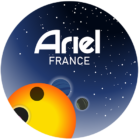.
Soutenance de thèse d’Alice Maurel
Alice Maurel (Sorbonne Université) Une étude de l’émission thermique des planètes rocheuses avec JWST : le cas des planètes TRAPPIST-1, sous la direction de Beaulieu, Jean-Philippe, Drossart, Pierre – IAP, 29 septembre 2025 à 14h
Ariel Data Challenge 2025
The Ariel Data Challenge 2025 is open in June 2025. It is accessed from the UCL website The participation of the Ariel-France team in the preparation of the ADC.
Since 2019, UCL’s Ariel team has organized an annual open competition on a specific problem related to ESA’s Ariel mission. The Ariel mission (scheduled for launch in 2030) will study exoplanets by transit spectroscopy around bright stars. An Ariel working group is currently studying artificial intelligence (AI) methods for data reduction and interpretation for feeding discussions in the Ariel Science Working team.
The Ariel France team has included Angèle Syty (IAP) and Orphée Faucoz (CNES). The 2025 challenge centres around processing of simulated data from the Ariel instruments (the AIRS spectrograph and the fine pointing system) to predict the noise transmission spectra of each of the associated planetary systems. Each source of noise was generated by Ariel’s ExoSim instrument simulator, and include photon noise, jitter, and many other systematic errors. The IAP team, in collaboration with Orphée Faucoz from CNES, provides the participants with a preliminary machine learning solution (“baseline”), which they will have to improve on to obtain the best possible score in the competition. The model was developed using simple Convolutional Neural Network (CNN) techniques and the open source Keras deep learning libraries.
Ariel takes spectra of bright stars at low resolution for several hours to discover the signatures of a transiting planet’s atmosphere. This scientific signal is deeply buried under systematic errors. Using simulated images from the AIRS spectro-imaging detector and telemetry information, we need to extract the planet’s spectrum. The aim is to use AI to retrieve the planet’s spectra and compare the efficiency of such techniques with conventional data reduction pipelines. The preparation of Ariel Data Challenge 2025 (ADC2025) has been carried on to produce a baseline as a basic solution for ADC2025. The public challenge version must be accessible to mainstream computing resources. Data simplification and compression work has been carried out to assist participants.
Beyond these competitions, the long-term aim of using AI techniques for Ariel is to provide more accurate and faster techniques to improve on the the classic inversion, simulation and reduction methods that form the basis of data preparation before ingestion by machine learning programs. While it is difficult to predict where these tecniques will be in a few years’ time, it is essential to explore this field, and this is the subject of an Ariel thesis, supervised at IAP, starting in October 2024.
A presentation of the work done in this context has been proposed to the EPSC/DPS meeting (Helsinki, September 2025)
Ariel Data Challenge 2024
The Ariel Data Challenge 2024 took place from June 2024 to September 2024.
Since 2019, UCL’s Ariel team has organized an annual open competition on a specific problem related to ESA’s Ariel mission. The Ariel mission (scheduled for launch in 2029) will study exoplanets by transit spectroscopy around bright stars. An Ariel working group has been studying artificial intelligence (AI) methods for data reduction and interpretation for over five years.
The IAP team led by Virgine Batista competed in the 2023 Ariel Data Challenge which tried to find the best methods to determine the composition of planetary atmospheres. This year, the group joined the Data Challenge organisation team. The 2024 challenge centres around processing of simulated data from the Ariel instruments (the AIRS spectrograph and the fine pointing system) to predict the noise transmission spectra of each of the associated planetary systems. Each source of noise was generated by Ariel’s ExoSim instrument simulator, and include photon noise, jitter, and many other systematic errors. The IAP team, in collaboration with Orphée Faucoz from CNES, provides the participants with a preliminary machine learning solution (“baseline”), which they will have to improve on to obtain the best possible score in the competition. The model was developed using simple Convolutional Neural Network (CNN) techniques and the open source Keras deep learning libraries.
Ariel takes spectra of bright stars at low resolution for several hours to discover the signatures of a transiting planet’s atmosphere. This scientific signal is deeply buried under systematic errors. Using simulated images from the AIRS spectro-imaging detector and telemetry information, we need to extract the planet’s spectrum. The aim is to use AI to retrieve the planet’s spectra and compare the efficiency of such techniques with conventional data reduction pipelines. The preparation of Ariel Data Challenge 2024 (ADC2024) at IAP has been greatly aided by high-performance computing resources on IAP’s Infinity[1]high performance cluster. However, the public challenge version must be accessible to mainstream computing resources. Data simplification and compression work has been carried out to assist participants.
[1] The IAP Cluster Infinity has been mainly supported by the Région Ile-de-France (DIM/ACAV)
Ariel Data Challenge 2022
Chaque année Ariel-UCL organise un challenge pour la réduction et l’analyse de données simulées Ariel. Ce challenge a pour but de stimuler et promouvoir au sein de la communauté exoplanète l’exploration et développement de nouvelle méthodes pour traiter les données reçues par le telescope. Ce lien mène au Data Challenge 2022. Deux membres de l’équipe Ariel (Quentin Changeat et Gordon Yip, UCL) ont préparé une base de données, disponible en ligne, et les outils pour y participer. La competition est terminée, mais c’est une ressource tres utile et d’actualité
